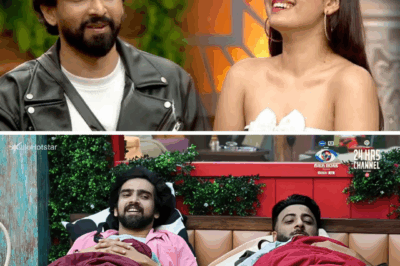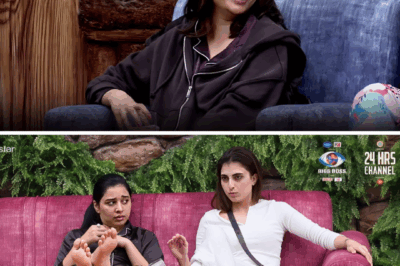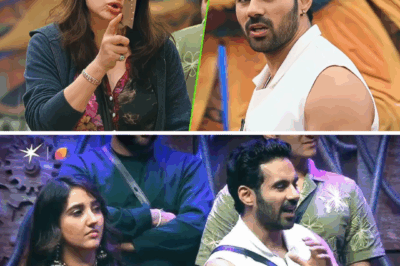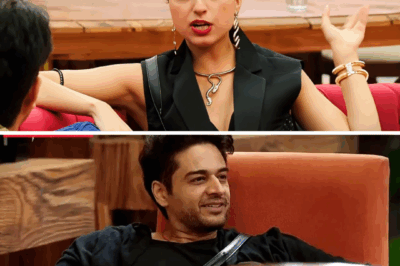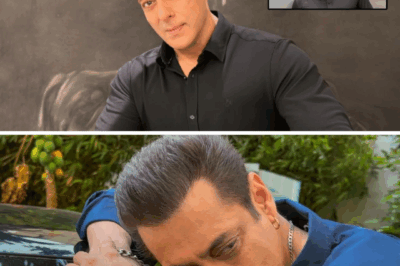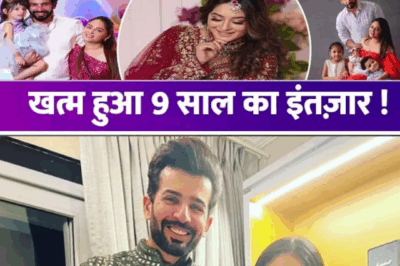It was a seemingly ordinary day in Bollywood, yet the tranquility of Govinda’s world was about to be shattered in a way that few could have anticipated. Fans scrolling through social media feeds were suddenly confronted with clips and quotes that would ignite a storm: Sunita Ahuja, the wife of one of Bollywood’s most beloved actors, had openly criticized their family priest in a candid podcast. The remarks were sharp, personal, and utterly unexpected. They immediately sparked outrage, speculation, and curiosity across the nation.
The video of Govinda’s apology soon followed, and it was a moment few expected. The usually jovial actor appeared solemn, his voice measured, his expression heavy with the weight of the controversy. In a heartfelt message, he addressed the statements made by his wife, emphasizing his respect for Pandit Mukesh Shukla, the family priest who had supported him and his family for years. “My wife made inappropriate remarks about Pandit Mukesh Shukla. I strongly condemn them and extend my deepest apologies. Pandit Mukesh Ji and his family have stood by me in difficult times,” Govinda said, his words carrying both humility and urgency.
The public apology only heightened the intrigue. Why had such remarks been made in the first place? Sunita’s comments were more than casual critique; they were pointed, suggesting that the priest demanded large sums for rituals, and questioning the value of those rituals altogether. One clip circulated widely, where she reportedly said, “We also have one in our house, Govinda’s pandit. He’s fake. He keeps suggesting new pujas … give Rs 2 lakh.” Such blunt language, directed at a figure deeply respected within their household and beyond, was incendiary.
Social media immediately exploded. Fans, journalists, and critics dissected every word, wondering what this revelation said about Bollywood’s private lives. Some expressed support for Sunita’s candidness, seeing it as a critique of ostentation and misplaced priorities. Others condemned the remarks, viewing them as disrespectful and unnecessarily public. The debate highlighted an enduring tension in celebrity culture: the collision between private truths and public perception, between personal grievances and the pressure of living life under constant scrutiny.
Amidst the chaos online, Govinda’s video stood out not just for its content but for its tone. Unlike many celebrity apologies that feel scripted or defensive, his was measured, sincere, and almost somber. He acknowledged his wife’s remarks without excusing them, reinforced his respect for the priest, and implicitly reminded audiences of the longstanding relationships and trust that had been built over years. It was a delicate balancing act, one that spoke volumes about Govinda’s understanding of both personal responsibility and the expectations placed upon him as a public figure.
Inside the household, the tension must have been palpable. Sunita Ahuja’s remarks reflected frustrations that had perhaps simmered beneath the surface for years. According to insiders, her critique wasn’t just of ritual expenses but of the inner circle surrounding Govinda, whom she referred to as “chamchas” or sycophants. This added a layer of complexity: the comments were not just about the priest, but about trust, influence, and loyalty in a household constantly under public scrutiny.
For fans, this was more than gossip; it was a rare glimpse into the private dynamics of a beloved actor’s life. The curiosity was irresistible. How did a family as seemingly harmonious as Govinda’s reach this point? What was the history between Sunita, Govinda, and the priest? Was this moment of public disclosure a symptom of long-standing tensions, or a one-off lapse in judgment during an unscripted conversation? Every media outlet and social platform had an answer, yet the full truth remained tantalizingly just out of reach.
The incident also raised broader questions about faith, tradition, and celebrity culture. Rituals, priests, and devotion are deeply ingrained in many Bollywood households, serving as both spiritual guidance and social signaling. When Sunita criticized the priest’s advice and fees, it struck at these traditions, challenging assumptions about loyalty, respect, and the cost of spiritual guidance. Govinda’s measured response, in turn, underscored the delicate dance between honoring tradition and managing personal relationships.
Yet the story was far from resolved. Analysts noted that the controversy was likely to have ripple effects: the priest might respond publicly, the couple’s private disagreements could continue to play out in the media, and fans would speculate endlessly about hidden dynamics. For Govinda, the stakes were high. His career, reputation, and personal relationships were all intertwined in a web that required careful navigation. A single misstep in public messaging could inflame the controversy further.
Even as news channels replayed clips and headlines circulated online, there were moments of human vulnerability. Fans shared empathy for Govinda, noting the courage it took to publicly apologize for remarks made by a close family member. Many recognized the difficulty of maintaining composure when personal disputes spill into the public domain. It was a reminder that celebrities, despite fame and adoration, contend with the same emotional challenges as anyone else—amplified, of course, by millions of eyes watching every move.
As the day turned to evening, the conversation continued to evolve. Media outlets explored historical context, tracing Govinda’s long relationship with Pandit Mukesh Shukla and highlighting moments where the priest had been integral to family milestones and spiritual guidance. The apology video became a case study in crisis management, social dynamics, and the complexities of family life in the glare of public attention.
Behind the headlines and viral clips, however, the core of the story remained deeply human. At its heart, this was about respect, communication, and the strains that come with love, loyalty, and personal belief systems. Govinda’s apology, and Sunita’s candidness, were part of a broader narrative about how families navigate disagreements, honor traditions, and manage emotions—challenges magnified exponentially when the world is watching.
In the weeks to follow, this incident would likely fade from daily news, replaced by new controversies, new scandals, and new public moments. But for those who witnessed it—the fans, the media, and the family itself—the lessons lingered. Celebrity life may dazzle, but it is also fraught with personal complexities. Words spoken casually can become headline news. Private disagreements can become public discourse. And amidst it all, human emotions—anger, remorse, frustration, and love—remain universal, connecting even the most famous figures to the experiences of ordinary people.
The Govinda-Sunita episode serves as a reminder: behind every viral headline is a story of people navigating relationships, traditions, and expectations. In this case, the story unfolded with drama, emotion, and public fascination, leaving audiences wondering not only what was said, but what it revealed about life behind the camera, in one of Bollywood’s most scrutinized households.
The day after Govinda’s public apology, social media was ablaze. Clips of his heartfelt message were shared widely, accompanied by heated debates, memes, and speculative threads. Fans, journalists, and commentators dissected every nuance of his words. Some praised his composure, calling it a masterclass in crisis management, while others wondered if the apology was enough to mend what some perceived as deeper family rifts. The question on everyone’s mind: what truly happens behind the closed doors of Bollywood households, far from the glamour and cameras?
Meanwhile, Sunita Ahuja remained in the eye of the storm. Her candid remarks had gone viral, attracting both criticism and support. Some applauded her honesty, seeing it as a bold challenge to blind adherence to ritualistic practices and the influence of so-called “sycophants” in a celebrity household. Others accused her of disrespect and airing private grievances in a public forum. Her statements were dissected line by line, with media outlets speculating on hidden tensions, possible financial disputes, and long-standing differences in values between her and Govinda.
Pandit Mukesh Shukla, the priest at the center of the controversy, maintained a dignified silence initially. Insiders hinted that while he was personally hurt by Sunita’s comments, he appreciated Govinda’s swift apology and public defense. The priest’s long-standing relationship with Govinda had weathered years of personal and professional ups and downs, and many saw his calm reaction as a testament to his patience and understanding. Nonetheless, questions lingered: would he address the comments publicly, or let Govinda’s apology serve as the final word?
The incident also sparked wider conversations in the media about faith, celebrity influence, and household dynamics. Columnists and talk shows debated whether Sunita’s remarks revealed an underlying trend among Bollywood celebrities questioning traditional practices, or if this was simply a family dispute amplified by modern social media culture. Audiences were captivated, not just by the controversy itself, but by the human drama at its core—the clash of personal beliefs, respect for tradition, and the challenges of navigating public scrutiny.
Interestingly, the controversy prompted reflections among fans about their own lives. Social media threads emerged where people shared stories of disagreements with family members over religious practices, monetary contributions for rituals, and conflicting values. The Govinda incident had inadvertently opened a mirror, showing how universal such conflicts could be, even for the rich and famous. It sparked empathy as well as curiosity—everyone wanted to understand the layers of relationships, obligations, and emotions that had brought the family to this public moment.
Industry insiders suggested that the situation was also a delicate balancing act for Govinda professionally. Celebrity apologies can impact endorsements, media appearances, and fan loyalty. His decision to publicly address his wife’s remarks rather than ignore them demonstrated strategic thinking: he acknowledged the issue, defended the priest, and maintained his own credibility and dignity. Yet, there was no denying the strain—balancing family loyalty, personal beliefs, and the expectations of millions of fans is no small feat, especially when private disagreements become global talking points overnight.
As days passed, subtle developments kept the controversy alive. Sunita’s past interviews were revisited, and analysts tried to decode her intentions: was this a spontaneous comment or a deliberate statement challenging household dynamics? Journalists speculated about the impact on Govinda and Sunita’s marriage, while fans shared mixed reactions, oscillating between shock, support, and judgment. The public was engaged not just with the facts, but with the untold stories behind them—who was right, who was wrong, and what this meant for the household hierarchy and Bollywood’s public image.
The incident, though centered on a personal spat, highlighted larger themes about celebrity life. Private moments are magnified, missteps become public lessons, and personal relationships are judged by millions. Govinda’s composed apology was praised as a model of emotional intelligence, showing how to navigate conflict while respecting all parties involved. Sunita’s comments, whether impulsive or intentional, reminded audiences that even in the world of fame and wealth, personal frustrations, beliefs, and disagreements remain deeply human.
By the end of the week, the viral storm had begun to settle, but the echoes remained. Media coverage transitioned from sensational headlines to analytical pieces, exploring family dynamics, celebrity responsibilities, and the boundaries between personal and public life. Conversations continued online, with fans debating the morality, honesty, and courage displayed by both Govinda and Sunita. Even in resolution, the story retained its edge—leaving audiences intrigued, reflective, and aware of the complexity hidden beneath glamorous exteriors.
Ultimately, the Govinda-Sunita episode became more than just a viral controversy. It was a vivid reminder of the fragility of reputation, the weight of public scrutiny, and the intricate dance between personal belief and tradition. It revealed how a single comment, amplified by a global audience, could trigger discussions far beyond the household itself—about respect, loyalty, and the human struggles behind celebrity life. And while the apology video may have ended one chapter, the curiosity, lessons, and lingering questions ensured that the story would remain a talking point for months to come.
As the weeks passed since Govinda’s public apology, the story of his household continued to captivate the nation, proving that celebrity life is never fully private. Media outlets, both in India and internationally, kept the story alive, exploring the tensions between personal beliefs, family loyalty, and public perception. The episode had become more than just a marital dispute—it was a window into the pressures, expectations, and emotional complexities that even Bollywood icons cannot escape.
Pandit Mukesh Shukla eventually broke his silence, offering a dignified response. While he acknowledged the hurt caused by Sunita Ahuja’s remarks, he praised Govinda for his humility and public acknowledgment. “Every family has disagreements, but respect and understanding are what matter,” he said. His measured words added a layer of closure, yet also highlighted the delicate balance of maintaining trust and relationships amidst a very public controversy.
Fans and social media users continued to debate the incident, but over time, a pattern emerged: many admired Govinda’s poise, while others sympathized with Sunita’s candidness. Opinion pieces in leading newspapers delved into the broader issues the controversy had exposed—gender dynamics, the questioning of tradition, and the public’s fascination with celebrity private lives. For many, the episode sparked introspection about their own families, rituals, and the way private disagreements are handled.
Interestingly, the incident also had ripple effects within Bollywood. Discussions arose about how celebrities navigate personal expression in a world where every word can go viral. Some industry insiders suggested that the episode might influence how stars engage with media, interviews, and podcasts in the future, emphasizing caution but also highlighting the power of transparency. The Govinda-Sunita episode had, in essence, become a case study in the intersection of fame, family, and accountability.
The personal impact on Govinda and Sunita was palpable. Close friends reported that the couple had engaged in private conversations to reconcile differences and reestablish trust. Publicly, they maintained a united front, but the lessons were clear: open communication, respect, and sensitivity are essential, particularly when personal matters can become public spectacles overnight. Their experience became a poignant reminder that even in the glare of cameras and media scrutiny, human emotions, misunderstandings, and reconciliation remain universal themes.
By the time the controversy had fully settled from the headlines, it had left behind multiple lessons for the public, celebrities, and media alike. Govinda’s handling of the situation underscored the importance of humility, accountability, and measured responses, while Sunita’s remarks reminded audiences that even candid criticism can trigger a far-reaching conversation about trust, loyalty, and tradition. For the public, it was a rare glimpse into a world where fame does not insulate anyone from the complexities of family dynamics and the consequences of public statements.
Ultimately, the Govinda-Sunita episode became a story about more than celebrity gossip—it was about relationships, responsibility, and the fragility of reputation. It showed how quickly personal disagreements can escalate into viral controversies, and how important it is to navigate such challenges with grace, honesty, and respect. As life returned to a semblance of normalcy in their household, the public remained intrigued, the lessons lingering: fame magnifies everything, words carry weight, and even the smallest comment can trigger a national conversation.
In the end, the incident reinforced a timeless truth: celebrity life may sparkle with glamour, but beneath it lies a human world of emotions, conflicts, and reconciliations. Govinda’s apology, Sunita’s candidness, and Pandit Mukesh Shukla’s dignified response collectively illustrated the delicate interplay of respect, family, and public perception—a story that would be remembered not just for the scandal, but for the emotional lessons it imparted.
News
Bigg Boss 19 Drama: The Housegirls’ Craze Over Amaal
The Bigg Boss 19 house had always been a stage for drama, secrets, and unexpected alliances, but this week, it…
Drama Alert in Bigg Boss 19: Tanya and Farrhana’s Gossip Sparks House Tension
Bigg Boss 19’s house has always thrived on drama, but Episode 74 promised a whirlwind like no other as Tanya…
Episode 74 Drama Alert: Kunickaa Fights Abhishek in Bigg Boss 19
The tension in Bigg Boss 19’s house has been simmering for weeks, but Episode 74 exploded like a powder keg…
Inside Bigg Boss 19: Mridul Confronts Farrhana in Heated Clash
The Bigg Boss 19 house, usually a whirlwind of laughter, playful banter, and strategic alliances, was anything but calm on…
Salman Khan Faces New Legal Troubles: Fans Worried About Bollywood Star
Salman Khan, one of Bollywood’s most iconic stars, is once again at the center of a storm, and fans are…
From Comeback to Clarity: Mahhi Vij on Her New Phase Amid 14‑Year Marriage Buzz
For nearly a decade, Mahhi Vij has been a familiar face in the hearts of Indian television audiences. From her…
End of content
No more pages to load

